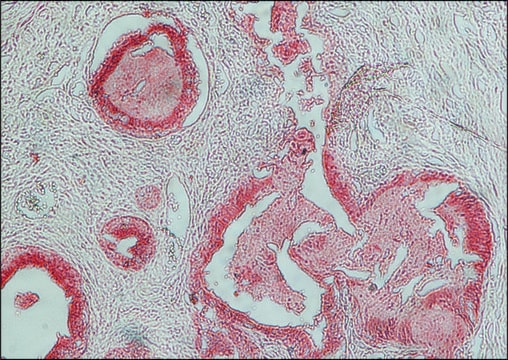C2821
Anti-Goat IgG (whole molecule)–Cy3 antibody produced in rabbit
affinity isolated antibody, buffered aqueous solution
Sign Into View Organizational & Contract Pricing
All Photos(1)
About This Item
Recommended Products
biological source
rabbit
Quality Level
conjugate
CY3 conjugate
antibody form
affinity isolated antibody
antibody product type
secondary antibodies
clone
polyclonal
form
buffered aqueous solution
species reactivity
goat
technique(s)
immunohistochemistry (formalin-fixed, paraffin-embedded sections): 1:300
shipped in
wet ice
storage temp.
2-8°C
target post-translational modification
unmodified
General description
The product binds to all goat Igs.
Application
Anti-Goat IgG (whole molecule)−Cy3 antibody produced in rabbit has been used in immunofluorescent labeling.
Anti-Goat IgG (whole molecule)-Cy3 antibody produced in rabbit has been used for immunofluorescent staining and immunohistochemistry of formalin-fixed, paraffin-embedded sections at a working dilution of 1:300. It has also been used in immunocytochemistry of mouse pancreatic islet cells.
Biochem/physiol Actions
IgG antibody subtype is the most abundant of serum immunoglobulins of the immune system. It is secreted by B cells and is found in blood and extracellular fluids and provides protection from infections caused by bacteria, fungi and viruses. Maternal IgG is transferred to fetus through the placenta that is vital for immune defense of the neonate against infections. The coupling of Cy3 to Anti-Goat IgG (whole molecule) antibody allows for the visualization of proteins by fluorescent microscopy.
Physical form
Solution in 0.01 M phosphate buffered saline, pH 7.4, containing 1% bovine serum albumin and 15 mM sodium azide
Disclaimer
Unless otherwise stated in our catalog or other company documentation accompanying the product(s), our products are intended for research use only and are not to be used for any other purpose, which includes but is not limited to, unauthorized commercial uses, in vitro diagnostic uses, ex vivo or in vivo therapeutic uses or any type of consumption or application to humans or animals.
Not finding the right product?
Try our Product Selector Tool.
Storage Class Code
10 - Combustible liquids
WGK
nwg
Personal Protective Equipment
dust mask type N95 (US), Eyeshields, Gloves
Choose from one of the most recent versions:
Already Own This Product?
Find documentation for the products that you have recently purchased in the Document Library.
Thomas Wirth et al.
Cancer research, 65(16), 7393-7402 (2005-08-17)
Hepatocellular carcinomas (HCC) are drug-resistant tumors that frequently possess high telomerase activity. It was therefore the aim of our study to investigate the potential of telomerase-dependent virotherapy in multimodal treatment of HCC. In contrast to normal liver, HCC xenografts showed
Evaluation of the stromal vascular fraction of adipose tissue as the basis for a stem cell-based tissue-engineered vascular graft
Krawiec JT, et al.
Journal of Vascular Surgery, 66(3), 883-890 (2017)
C Zweier et al.
Journal of medical genetics, 45(11), 738-744 (2008-08-30)
Haploinsufficiency of the gene encoding for transcription factor 4 (TCF4) was recently identified as the underlying cause of Pitt-Hopkins syndrome (PTHS), an underdiagnosed mental-retardation syndrome characterised by a distinct facial gestalt, breathing anomalies and severe mental retardation. TCF4 mutational analysis
Li Bai et al.
Molecular medicine reports, 13(5), 3835-3841 (2016-04-02)
Acute liver injury in the setting of fibrosis is an area of interest in investigations, and remains to be fully elucidated. Previous studies have suggested the beneficial effects of liver fibrosis induced by thioacetamide and partial bile duct ligation against
Bingxiu Zhou et al.
Molecular medicine reports, 18(2), 1361-1368 (2018-06-15)
Sipi soup (SPS), the aqueous extract derived from the root bark of Sophora japonical L, Salix babylonica L., Morus alba L., as well as Amygdalus davidiana (Carr.) C. de Vos, is a traditional Chinese medicine frequently used to prevent and
Our team of scientists has experience in all areas of research including Life Science, Material Science, Chemical Synthesis, Chromatography, Analytical and many others.
Contact Technical Service





